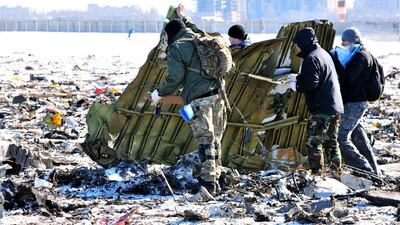Russia’s civil aviation authority issued its first report on Friday on last month’s crash of a FlyDubai plane in south-west Russia, providing insight into the event that killed all 62 people on board.
The interim report, prepared by Russia’s Interstate Aviation Committee, said the plane’s sudden descent occurred directly after pilots tried to climb out of a second aborted landing attempt. No conclusions were drawn by investigators as to the cause of flight FZ981’s crash.
Reacting to the report, FlyDubai chief executive Ghaith Al Ghaith said the airline shared a “desire to get conclusive findings as quickly as possible”.
“We are aware of the information that has been released,” he said. “We continue to support the investigating authorities in liaison with the General Civil Aviation Authority (GCAA).”
Strong winds and rain on March 19 at Rostov-on-Don airport, located about 950 kilometres south of Moscow, caused the crew to make several attempts to land the aircraft.
A preliminary analysis of the data retrieved from the Boeing 737-800’s flight recorders revealed the plane was attempting to land manually, without the autopilot.
While approaching at a height of 340 metres, the pilots called off the landing because of windshear, an abrupt change in windspeed and direction.
The report said the crew decided to wait for weather conditions to improve before making another landing attempt.
At that point, at a height of 900m, controls were adjusted by the pilots with “a simultaneous control column nose down input and stabiliser five-degree nose down deflection” resulting in an abrupt descent with negative vertical acceleration.
The report said the crew was unable to recover the plane, which hit the ground at more than 600 kilometres per hour.
Russian investigators will now work on deciphering the pilots’ conversation in the hours leading up to the crash before concluding their investigation.
A transcript with two hours of voice recordings taken from the plane’s cockpit required further analysis, the report said.
The Russian authority said its investigation was ongoing, and it was receiving assistance from the UAE and the United States.
The plane’s pilots – from Cyprus and Spain – had 5,965 and 5,769 hours’ flying time respectively, making them “quite experienced”, Mr Al Ghaith said.
Fifty five passengers, including 44 Russians, eight Ukrainians, two Indian nationals and one from Uzbekistan died in the crash. The other five crew included a Spaniard and one each from Colombia, Russia, the Seychelles and Kyrgyzstan.
esamoglou@thenational.ae

